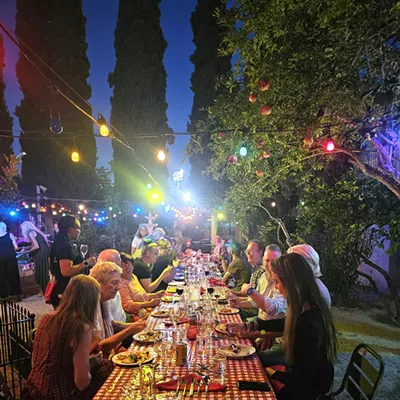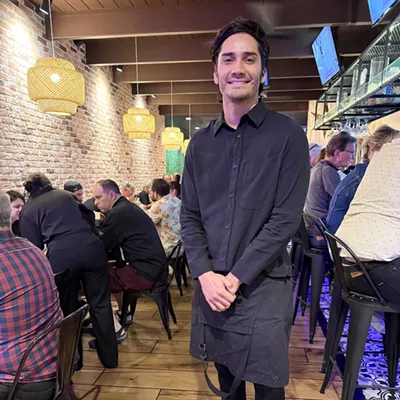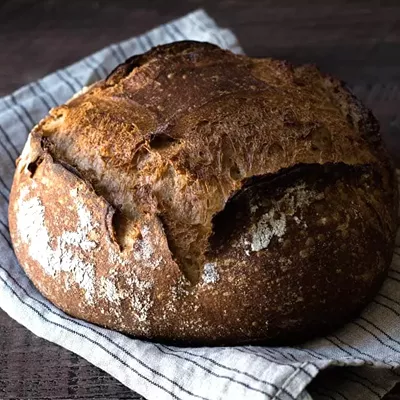Nothing makes the recent argument at City Hall over whether residents should be permitted to raise chickens seem more passé than Noel Patterson's backyard. For him, chickens are the tip of convention of the iceberg of a small-scale revolution. Alongside 18 or so hens, he has an impressive garden, various fermentation projects and multiple beehives. Luckily, he also has some very understanding neighbors.
"When I got to eight hives, my neighbor, who is amazing, was finally like, 'hey, this might be a little much,'" Patterson says.
Patterson, the two hands behind Dos Manos Apiaries, is driven by the desire to build a community around local food production. What is now an apiary started as a thoughtful, if bold, gift from an ex. Patterson had been growing his own food for a long time. He had fruits and vegetables from his garden. He started raising chickens for protein, eggs, meat and rendered fat. At the time of our interview, he had huge bags full of dried corn in his living room that he'd grown in his backyard. Sweetener was the one thing at that time that he couldn't produce on his own. He mentioned to his then-girlfriend that it might be cool to try raising bees. For his next birthday, she surprised him with a beehive.
"Tucson High is my front door, Fourth Avenue is my backdoor and there's a lot of traffic around here. I had to wonder, 'Is this legal? Am I smart enough to take this on?,'" he says. "I was honestly a little intimidated by the whole thing."
After a couple of years and some help from mentors, Patterson got the hang of it. Back then, he worked as a rep for a wine distributor, and he spent most of his day discussing food and wine with local businesses.
"I'm talking all day with people who get it," he says. "So I would throw in little jars of honey from the backyard to share with them."
Peter Wilkie, the owner of Time Market, Wilco and The B Line, wanted more than just a sample, but, due to limited space, Patterson couldn't produce enough to sell his honey retail. Production limitations weren't the only things adding trepidation to Patterson's honey business.
"I didn't want to turn something that's fun into work," Patterson says.
However, Wilkie wouldn't take no for an answer. Originally, Patterson planned to put bees on Time Market's roof, but Tucson is way too hot for rooftop bees, so the hive ended up in Wilkie's yard. The Wilkie hive started a buzz, and other local restaurateurs wanted in. To keep up with production without having to foot the whole startup cost, Patterson struck a deal: if a restaurant financed a hive, he would build and maintain it. So far, along with Wilkie's spots, Patterson's restaurant sponsors include Exo Roast, Prep & Pastry, Good Oak Bar, The Coronet, Cafe Passe, Proper, Pizzeria Bianco and Renee's Organic Oven, with a forthcoming hives from Independent Distillery and Nook.
No matter what, though, Patterson is careful to make sure the bees come first, rather than forcing them to be small, buzzing production facilities.
"Everything that happens with honey has to do with flowers," says Patterson.
That means that honey production is a seasonal affair. Bees make honey so that the hive will have something to eat when plants aren't flowering. A responsible beekeeper only wants to harvest the excess honey produced, not the stash that the bees need for themselves.
"There's a part of the hive I don't touch," says Patterson. "It's like there's one refrigerator, and I make sure that's always full. I give them an extra refrigerator, and whatever they put in the second refrigerator, that's what I take."
Demand is so high for his honey that Patterson has been running out in December, when the bees are living happily off of their single fridge of food. The second fridge doesn't start filling up until May, leaving Patterson with several months of no product. Although too much demand is a good problem to have, it is still a problem. The world of bees, though, definitely has some very serious issues to attend to as well.
For all the emphasis on hands, Patterson's approach to beekeeping is remarkably hands off. As pollinators, bees play an essential role in food production, and their struggle to survive in a modern agricultural environment threatens food security. While the effects of pesticide use and monoculture farming have often been cited as potential causes of disease and colony collapse, Patterson thinks that commercial beekeepers are also culpable.
"The problems we have with bees have to do with management practices, chemical usage, dictating unnatural terms to the bees, treating a bee like a machine, trying to squeeze as much profit out of it for as little input as you can," he says.
Patterson's passion to teach more about beekeeping and the threat of colony collapse recently saw him leading beekeeping classes at Mirival. He's thrilled for the opportunity, and really enjoys teaching, but the classes are only available to Mirival guests. However, it is his role in the downtown community that drives him.
"The connection of the end users [in this case, the restaurants] to the food system, is the core of the concept," Patterson says. "This isn't local honey, this is neighborhood honey."
The honey that The Coronet serves comes from Patterson's backyard, merely blocks from the restaurant, and it's possible to imagine that nectar from the patio's blossoms has made its way into certain bites—that's really what it's about.
Like the bees themselves, Patterson likes to be involved in every stage of a project, hence the name Dos Manos. He wants his two hands, and in some cases only his two hands, to be part of every level of production.
"My goal has always been feeding my community. I think feeding people is actually a deeply meaningful act, and this is a way to do it and make a living at it," Patterson says.
The community extends beyond restaurants and Mirival. Patterson hosts a beekeeping class with the Community Food Bank of Southern Arizona and will be offering sponsoring restaurants an opportunity to take the same courses he teaches at Mirival. While he'd like to teach classes for the public, he is only one person, and there is only so much time.
"The reason I have so many projects," Patterson says, pointing to the various carboys and corn sacks and bins of chicks scattered around his living area, "is that I love the hands on part of it."
For that reason, he isn't interested in turning Dos Manos into a larger company that he would, inevitably, have to manage. He doesn't want to hire people to do the work that he loves, while he's stuck coordinating logistics and delegating tasks. Despite his best efforts, or perhaps because of them, Dos Manos is pushing against this limitation, but like the bees, he's careful not to push his own production past that second fridge, as it were.
"I could probably make good money if I wanted to be a business manager with all of this," Patterson says. "But I don't. I want to fuck around with the bees."






